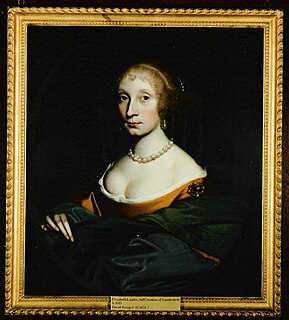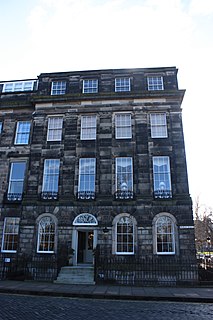
Charles Maitland, 3rd Earl of Lauderdale, was the second son of John Maitland, 1st Earl of Lauderdale.

Charles Dundas, 1st Baron Amesbury was a British politician.

The courts of Scotland are responsible for administration of justice in Scotland, under statutory, common law and equitable provisions within Scots law. The courts are presided over by the judiciary of Scotland, who are the various judicial office holders responsible for issuing judgments, ensuring fair trials, and deciding on sentencing. The Court of Session is the supreme civil court of Scotland, subject to appeals to the Supreme Court of the United Kingdom, and the High Court of Justiciary is the supreme criminal court, which is only subject to the authority of the Supreme Court of the United Kingdom on devolution issues and human rights compatibility issues.
The Treasurer-depute was a senior post in the pre-Union government of Scotland. It was the equivalent of the English post of Chancellor of the Exchequer.
Alexander de Forbes, 1st Lord Forbes, also feudal baron of Forbes, was a Scottish nobleman.
The Sheriff of Argyll was historically a royal officer charged with enforcing the king's rights in Argyll; in Scotland, the concept of sheriff gradually evolved into a judicial position.

David Hume, Baron Hume of Ninewells FRSE (1757–1838) was a Scottish advocate, judge and legal scholar, whose work on Scots criminal law and Scots private law has had a deep and continuing influence. He is referred to as Baron Hume to distinguish him from his uncle, David Hume the philosopher.
The Sheriff of Aberdeen was a royal official who was responsible for enforcing justice in Aberdeenshire, Scotland. Prior to 1748 most sheriffdoms were held on a hereditary basis. From that date, following the Jacobite uprising of 1745, they were replaced by salaried sheriff-deputes, qualified advocates who were members of the Scottish Bar.
The Sheriff of Roxburgh was historically the royal official responsible for enforcing law and order in that area of Scotland. Prior to 1748 most sheriffdoms were held on a hereditary basis. From that date, following the Jacobite uprising of 1745, the hereditary sheriffs were replaced by salaried sheriff-deputes, qualified advocates who were members of the Scottish Bar.
The Sheriff of the Lothians and Peebles was historically the office responsible for enforcing law and order and bringing criminals to justice in The Lothians and Peebles, Scotland. Prior to 1748 most sheriffdoms were held on a hereditary basis. From that date, following the Jacobite uprising of 1745, the hereditary sheriffs were replaced by salaried sheriff-deputes, qualified advocates who were members of the Scottish Bar.
The Sheriff of Perth was historically a royal official, appointed for life, who was responsible for enforcing justice in Perth, Scotland. Prior to 1748 most sheriffdoms were held on a hereditary basis. From that date, following the Jacobite uprising of 1745, the hereditary sheriffs were replaced by salaried sheriff-deputes, qualified advocates who were members of the Scottish Bar.
The Sheriff of Kincardine was historically a royal appointment, held at pleasure, which carried the responsibility for enforcing justice in Kincardine, Scotland. Prior to 1748 most sheriffdoms were held on a hereditary basis. From that date, following the Jacobite uprising of 1745, the hereditary sheriffs were replaced by salaried sheriff-deputes, qualified advocates who were members of the Scottish Bar.
The Sheriff of Selkirk was historically a royal official responsible for enforcing justice in Selkirk, Scotland. Prior to 1748 most sheriffdoms were held on a hereditary basis. From that date, following the Jacobite uprising of 1745, the hereditary sheriffs were replaced by salaried sheriff-deputes, qualified advocates who were members of the Scottish Bar.
The Sheriff of Banff was historically the office responsible for enforcing law and order and bringing criminals to justice in Banff, Scotland.
The Sheriff of Clackmannan was historically the office responsible for enforcing law and order in Clackmannan, Scotland and bringing criminals to justice. Prior to 1748 most sheriffdoms were held on a hereditary basis. From that date, following the Jacobite uprising of 1745, the hereditary sheriffs were replaced by salaried sheriff-deputes, qualified advocates who were members of the Scottish Bar.
The Sheriff of Wigtown was historically the office responsible for enforcing law and order in Wigtown, Scotland and bringing criminals to justice. Prior to 1748 most sheriffdoms were held on a hereditary basis. From that date, following the Jacobite uprising of 1745, the hereditary sheriffs were replaced by salaried sheriff-deputes, qualified advocates who were members of the Scottish Bar.
The Hon James Clerk-Rattray FRSE FSAScot (1763–1831) was an 18th/19th century Scottish landowner and lawyer who rose to be Baron of the Exchequer.

James Erskine, Lord Barjarg and Alva was an 18th-century Scottish lawyer who rose to be a Senator of the College of Justice. For convenience his name was usually contracted to James Erskine, Lord Alva.





